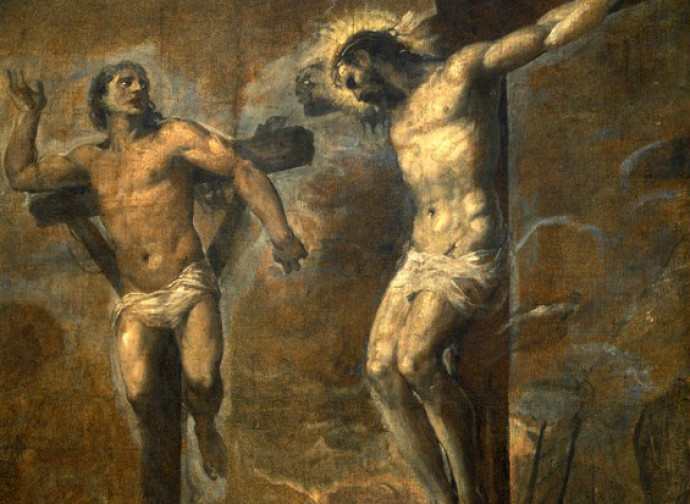Saint Disma
The Good Thief is celebrated today, on the same day as the Annunciation (whose celebration in 2024 is moved to April 8). His example on the cross is extolled by the Church Fathers and in works such as the Mystical City of God.

In the diary of sister Maria Faustina Kowalska, under the date October 11, 1936, we read that the great Polish saint, after taking Communion, heard Jesus say to her: «Your great trust in Me compels Me to grant you graces continually». In parallel, in other passages of the diary, we read what pain the lack of trust in His mercy caused Jesus, despite all the love He showed to men, which reached its peak in the mysteries of the Passion.
One can start from here to intuit something of that extraordinary mystery of grace why “the Good Thief”, one of the evildoers crucified along with Our Lord, was practically canonized by Jesus himself and is rightly venerated as a saint by the Church. He is traditionally known by several names, of which one of the best known is Disma (or also Dimas in Spanish and Portuguese).
On a simplistic reading of the Gospels, one might believe that one evangelist's account of the Good Thief contradicts that of the others. St. Mark and St. Matthew inform us at one point that even the crucified thieves - as well as the chief priests, scribes and others - took to insulting Jesus (cf. Mt 27:44; Mk 15:32). St. Luke, on the other hand, reports the insult to Jesus by one of the evildoers, who in turn receives rebuke from the other (cf. Lk 23:39-43). But the contradiction, we said, is only apparent because, quite apart from the details omitted in each of the accounts, the two truths - the insult and then the repentance in the same person of St. Disma - stand well together.
From the Gospels we know that Jesus was crucified at nine in the morning and expired at three in the afternoon. A six-hour long interval, in which Our Lord's sufferings reached their climax: but at the same time all His virtues, His infinite patience, His tenacity in wanting to save men, His greatest request («Father, forgive them, for they know not what they do») shone forth in the highest degree. And while the Redeemer stood on the cross, at His feet, suffering with Him and praying, stood the Mother, Mary, our Coredemptrix, Mediatrix and Advocate.
It was during this interval of time that evidently something changed in Disma's heart. In the Mystical City of God, a work recommended by various popes and saints, the venerable Mary of Ágreda - after praising the perfection of Jesus'love, which came, at the height of pain, to forgive His own executioners - writes: «One of the thieves, called Dima, sensed a glimmer of this arcane: he was inwardly enlightened by Mary's intercessory prayer, so that he could recognize his Redeemer from the first words [«Father, forgive them...», ed.] that He uttered on the cross. Moved by deep sorrow and contrition for his sins, he rebuked his companion: “Do you also not fear God and are damned to the same penalty? We rightly so, for we receive righteousness for our deeds; he, on the other hand, did nothing wrong”. And he added: “Jesus, remember me when you enter your kingdom”» (Mystical City of God, Book VI, ch. 22).
Several Church Fathers have rightly extolled St. Disma, not only because he had this perfect contrition, which men already in themselves hardly experience, but also because he confessed the kingship of Jesus: and he did so not when it would have been proper but simpler, as at the time of some miracle of his, but while Jesus himself was crucified, in his highest state of physical and moral humiliation, with his face and head disfigured by the crown of thorns and his whole body scourged and covered with sores.
Maria of Ágreda continued: «The effects of redemption found fertile ground in the heart of the good thief, the centurion and all those who had the courage to confess the Lord elevated on the cross; but the most fortunate was Dima, who deserved to hear his second words: “Truly I tell you, today you will be with me in paradise”» (ibidem).
Immediately afterwards, the Spanish nun dwells on the uniqueness of this saint's privileges: «Oh, happy thief! You alone obtained the word coveted by all the saints and righteous! The ancient patriarchs and prophets were not permitted to hear it: they deemed themselves already favored to descend into limbo and there wait for long centuries for the paradise that you earned in a moment by gladly giving other form to your trade. Now thou ceasest to steal other people's and earthly things, and straightway thou abductest heaven from his Majesty's hands; but thou abductest it justly, for He bestows it on thee by grace. You were the last disciple of his teaching in life and the first to put it into practice after learning it. You loved and corrected your brother, acknowledged your Creator and took back those who reviled him; you imitated him in suffering meekly, prayed to him humbly so that in the future he might remember your miseries. He was willing to grant your wishes instantly without deferring the prize He achieved for you and for all mortals» (ibid.).
